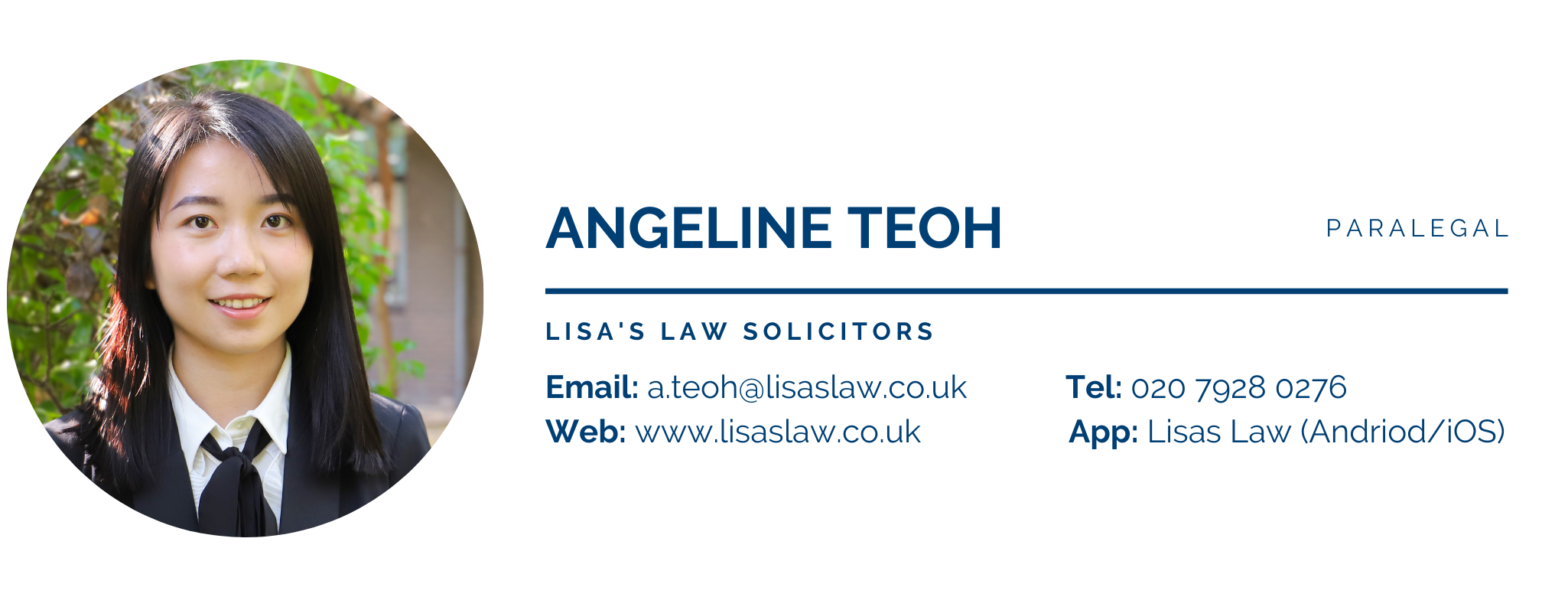Written by Angeline Teoh.
A Child Arrangements Order (CAO) is an order that regulates arrangements for a child. The Court can make orders relating to children arrangement, such as who should have children’s custody and how contact with children should be maintained and in what way. This article will try to cover the common question people frequently ask about this subject, such as who can apply for it, what order it can be, its procedure and what the Court will consider when dealing with such application. It also covers the importance of mutual agreement and family mediation.
What is contact?
Contact is the time that a child spends with an adult.
Examples:
- Direct contact between the child and the person named in the order
- Overnight staying contact
- Supervised contact, and
- Indirect contact through letters or cards
What can the court order?
The court may order:
- No contact, if it is in the best interests of the child (rare)
- The person with whom a child is to live (but not specifically where)
- The child to live with one parent only; or
- Share time between both parents (does not mean equal split)
What can you apply to the court for?
You can apply to the court for:
- Child Arrangements Order
- Prohibited Steps Order
- Specific Issue Order
- Consent Order
Who is entitled to apply for Child Arrangement Order?
The following are some examples of whom are entitled to apply for a Child Arrangement Order without permission from the court:
- Parents, including unmarried fathers
- Guardians
- Special guardians
- Step-parents with parental responsibility
- Any person in whose favour a residence order is in force in respect of the child
- Any party to a marriage in relation to whom the child is a child of the family
- Any person with whom the child has lived for a period of at least 3 years (need not be continuous but must not have begun more than five years before, or ended more than three months before the making of the application)
Any person who is not entitled (e.g. grandparents) may apply for court permission to bring an application.
If you are uncertain whether you need to obtain permission to bring an application, please construct our solicitor.
What is the requirement before applying to the court for Child Arrangement Order?
The Court encourages both parties to reach an agreement outside of the Court and only apply to the Court if it is necessary to do so.
Before applying for the court order, you are legally required to attend a Mediation Information and Assessment Meeting (MIAM), unless you are exempt or applying for consent order.
What is Mediation Information and Assessment Meeting (MIAM)?
A MIAM is an initial meeting where you will be given information about mediation and alternative ways of reaching an agreement without going to the Court. A mediator will consider with you whether other ways are suitable in your case.
Note: A MIAM is a one-off meeting and is not the same as mediation.
What happens at a MIAM?
At the MIAM, a mediator will explain:
- How mediation works
- The benefits of mediation
- Whether mediation is right for you
- The likely costs
- If you may qualify for help with the costs of mediation and legal advice
- Other options you could use to help you reach an agreement
After you attend the MIAM, the mediator should provide you with a signed document to confirm you attended a MIAM, or do not need to attend. If you haven’t got a document, you should ask the mediator for one.
You must bring the signed document from the mediator to the first court hearing. This is to confirm that you attended a MIAM or did not need to attend.
Why does the Court encourage both parties to reach an agreement outside of Court?
Even though the outcome is legally binding and the decision is made in the best interests of the child, but the court process can take a long time and can be very expensive. In addition, it may be more stressful for you and your child, increase conflict between you and the other party and you may not feel in control of your own case.
What are the alternative ways to reach an agreement?
If there are no safety concerns, you should see if there is a more suitable way to agree child arrangements with the other party than going to court.
By reaching an agreement out of court, you may be able to make the situation less stressful for the child, reduce conflict with the other party, help the child to continue family relationships, save time and money.
You can seek help from:
- Professional mediation
- Lawyer negotiation
- Collaborative lawyer (negotiate face-to-face)
What is the procedure?
- If you still can’t reach an agreement with the other party with the alternative way, then you can apply to the Court for a court order.
- The Applicant submits the application online or by post.
- The Court will set a time and place for you and the other party for a First Court Appointment. It is called First Hearing Dispute Resolution Appointment (FHDRA).
- Information about this appointment and the application will be served to the other party and any other adults involved as they need to complete a form and send it back to the court.
- The court will also send a copy of the application to Cafcass (Children and Family Court Advisory and Support Service) and they may attend the FHDRA.
- FHDRA is when the court investigates the issues and enquiries into the possibility of settlement.
- If agreement still cannot be reached at FHDRA, the court will identify the outstanding issues and will direct how the case should proceed.
- The court might order a Cafcass officer to prepare a report to help the judge at the final hearing, or it might order that the child be legally represented in the proceedings.
- The court may also order the parties involved to prepare written statements of the evidence that they want the court to hear.
- Sometimes the court will also adjourn the case for mediation to take place, if the court thinks the parties can reach an agreement through mediation.
- If the issues still can’t be sorted out, the court will ultimately hold a final hearing. At that stage, a judge will hear evidence from the adults involved, the Cafcass officer and any other necessary experts, and then make a decision.
How does the court decide what should happen?
The first concern of the court is the child’s welfare. The Children Act 1989 provides a list of considerations for the judge who has to decide the case, which help guide them in making a decision, including:
- The wishes and feelings of the child concerned
- The child’s physical, emotional and educational needs
- The likely effect on the child if circumstances changed as a result of the court’s decision
- The child’s age, sex, background and any other characteristics that will be relevant to the court’s decision
- Any harm the child has suffered or may be at risk of suffering
- The capability of the child’s parents (or other relevant people) in meeting the child’s needs, and
- The powers available to the court
Additionally, the court must presume when considering an application for a Child Arrangement Order, unless the contrary is shown, that involvement of each parent (of some direct or indirect kind but not any particular division of a child’s time) in the life of the child concerned will further the child’s welfare. That presumption applies if that parent can be involved in the child’s life in a way that does not put the child at risk of suffering harm.
The court must also be satisfied that making an order is better for the child than not making an order at all.
How long does Child Arrangement Order last for?
A Child Arrangement Order that regulates with whom the child is to live and when, will last until the child is 18 (unless the court orders an earlier date). A Child Arrangement Order that regulates when the child is to have contact with a person will usually end when the child is 16 but in limited circumstances can last until the child is 18.
Can you change or enforce an order?
A court order is not flexible. You will need to apply to court again if your situation changes.
You or the other party involved can apply to court to enforce the order if any of you is not following the terms.
Additional Information
The Court encourages both parties to reach an agreement without needing to apply for a court order. It is advised by the court to only apply for a court order if it is necessary to do so.
Please also note that you can’t bring your child abroad without the other party’s permission as taking a child abroad without permission is child abduction and it is a criminal offence.
Note:
- The above information is not advice and should not be treated as such.
- If you have any specific questions, you should consult our solicitors.
- In case of any discrepancies between the English version and Chinese version, the English version shall prevail.
Have questions? Get in touch today!
Call us on 020 7928 0276, phone calls are operating as usual and will be taking calls from 9:30am to 6:00pm.
Email us on info@lisaslaw.co.uk.
Use the Ask Lisa function on our website. Simply enter your details and leave a message, we will get right back to you: https://lisaslaw.co.uk/ask-question/
Or, download our free app! You can launch an enquiry, scan over documents, check progress on your case and much more!
Links to download below:
iPhone: https://apps.apple.com/us/app/lisas-law/id1503174541?ls=1
Android: https://play.google.com/store/apps/details?id=com.lisaslaw









